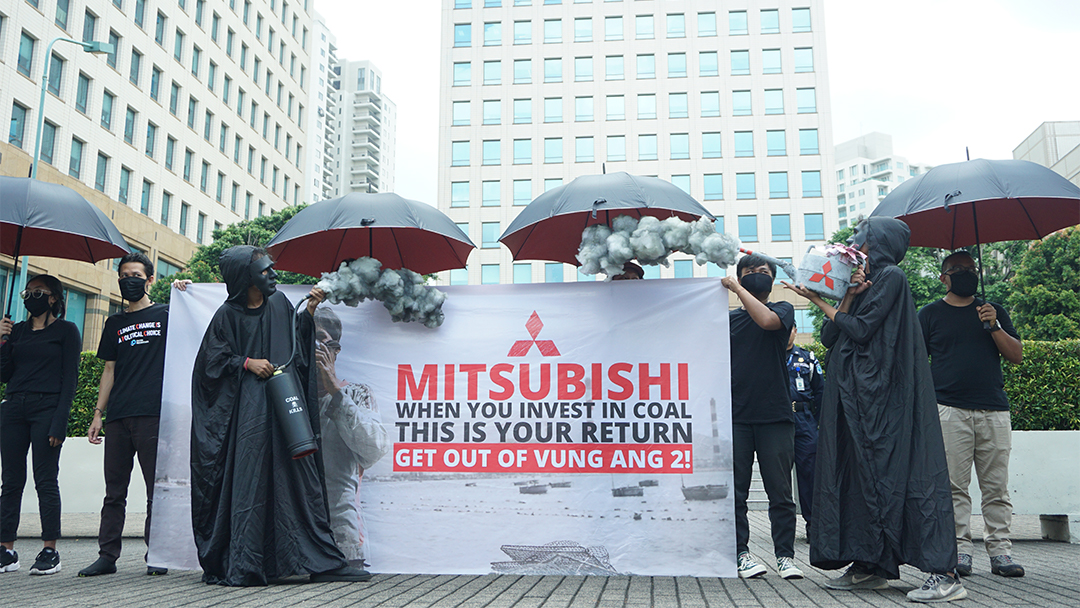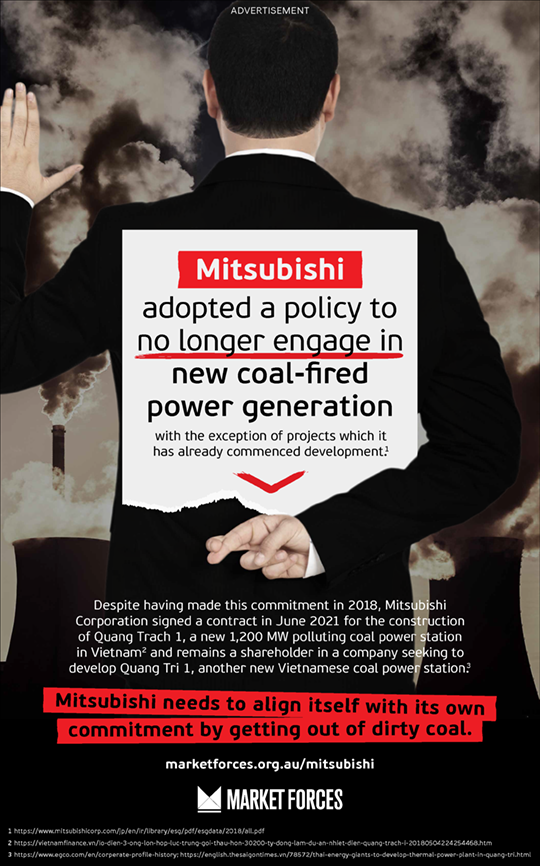Mitsubishi, don’t build Quang Trach 1.
Mitsubishi has violated its climate commitments by agreeing to build a new coal power project in Vietnam, Quang Trach 1. This project has considerable environmental and social risks.
Mitsubishi must reconsider its involvement with this project and its investors should urge the company to withdraw from the project as soon as possible.
三菱商事は、自ら設定した環境へのコミットメントを破り、
Image: Market Forces’ advertisement in the Financial Times dated 24 August 2021, calling out Mitsubishi’s policy violation.
TAKE ACTION
Send a message to Mitsubishi to tell the company that it must not build Quang Trach 1.
"*" indicates required fields
2018
Policy announced
In 2018, Mitsubishi revised its ESG Data Book and announced a policy that “in principle it will no longer engage in the development of new coal-fired power generation” with an exception for “projects which Mitsubishi Corporation has already commenced development.”
2019
Policy restated
The 2019 edition of the Data Book restates this policy.
Oct 2020
Mitsubishi bids on contract for Quang Trach 1
Despite this long-held policy, however, Mitsubishi bid on the EPC contract for Quang Trach 1 (in conjunction with Korea’s Hyundai Engineering and Construction (Hyundai E&C)) in October 2020. Vietnamese news reported that Electricity of Vietnam, the Vietnamese utility, awarded this consortium the contract earlier this month (June 2021).
June 2021
Mitsubishi signs on to build Quang Trach 1
In June 2021, Vietnamese news reported that a consortium of Mitsubishi Corporation (Mitsubishi) and Korea’s Hyundai Engineering and Construction (Hyundai E&C) won the EPC contract
Mitsubishi’s current ESG disclosure states that “Accordingly, MC has adopted a policy not to enter into any new coal-fired power generation businesses, with the exception of projects on which MC has already commenced development. We also intend to completely withdraw from all coal-fired power generation projects by 2050, which will involve targeting a reduction in the equity share of coal-fired power generation to around one-third by 2030 compared with 2020 levels (including projects under development and construction).”
The last of these “projects under development” should have been another Vietnamese coal power station, Vung Ang 2, with Mitsubishi withdrawing from Vinh Tan 3 earlier this year.
Despite this long-held policy, however, Mitsubishi bid on the EPC contract for Quang Trach 1 (in conjunction with Korea’s Hyundai Engineering and Construction (Hyundai E&C)) in October 2020. Vietnamese news reported that Electricity of Vietnam, the Vietnamese utility, awarded this consortium the contract earlier this month (June 2021).
This involvement in Quang Trach 1 represents a direct contradiction of Mitsubishi’s policies. Mitsubishi’s investors must hold the company accountable to its stated commitments.
About Quang Trach 1
Quang Trach 1, the first of two proposed coal power stations, is located in Quảng Bình province in central Vietnam.
The groundbreaking of Quang Trach 1 took place in July 2011, but the plant has remained unfinished. Part of the reason for delay has been land acquisition, with communities in the area alleging that they have not been appropriately compensated or resettled and remain concerned about environmental pollution. According to an article written in 2018:
- Although there was a plan created to relocate 78 households, which included land allotted for both residences and agricultural purposes, the relocation plan had not yet been implemented.
- Local authorities asserted that an additional 400 households who lived outside the land being acquired to build the plant wished to be resettled because of fears of environmental pollution.
- As these issues had not been addressed, in 2018, villagers blockaded the plants’ construction site seeking responses from the project’s sponsors.
There is also concern that the construction of the adjacent coal port would cause pollution by submerging waste and sludge into the sea. Given all these issues, in February 2021, it was reported that the government of Vietnam would assess the impacts of the project through the Ministry of the Environment.
It is unclear that these issues have been addressed. Without clear plans for resettlement and mitigation of environmental harms, Quang Trach 1 represents serious environmental and social risk to Mitsubishi and by extension its investors.
Vietnam is in a state of transition, increasing renewables in its energy mix
Vietnam’s energy market is in a state of transition, with the government continuing to finalise its power development plan to reduce its dependency on coal power. It has the opportunity to develop cleanly and sustainably – an opportunity it has taken advantage of by expanding solar power in its energy mix. In 2020, Vietnam became the third largest solar power market.
By building this coal power project, Mitsubishi will undoubtedly face risks to its reputation, being seen as pushing coal power on a country that is trying to transition out of polluting power.
Mitsubishi has already faced reputational damage because of its involvement in Vung Ang 2, and continues to experience significant backlash from the investor community.

Protestors calling on Mitsubishi to get out of the Vung Ang 2 coal power station in Vietnam.
Mitsubishi isn’t demonstrating that it understands climate risk
Any plans to build new coal power plants such as Quang Trach 1 are completely out of line with the Paris Agreement goal of keeping global warming to 1.5°C.
While Mitsubishi claims to recognise the risks to its business posed by climate change, building a coal power project does not demonstrate that it is managing those risks.
Sumitomo Corporation recently faced a strong rebuke from investors voting for a shareholder resolution which referenced Sumitomo’s construction of coal power projects. Investors found that continued involvement in coal power was an indication that its business strategy was not Paris-aligned. Mitsubishi would likely face the same concerns from its investors.
What Mitsubishi must do
Mitsubishi must reconsider its involvement in building Quang Trach 1 and its investors should urge the company to withdraw from the project as soon as possible.

